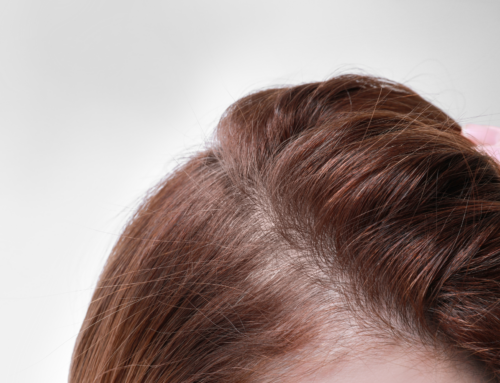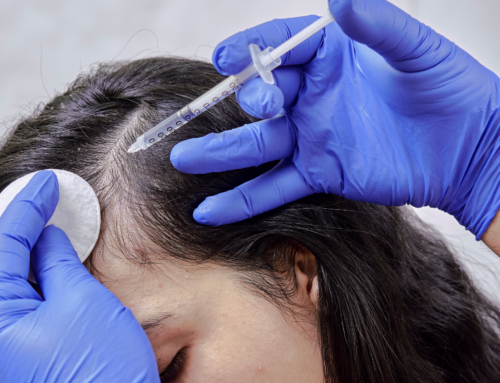Medication-Related Hair Loss
Medication-related hair loss is not always immediately obvious. If you’re losing your hair or experiencing fallout, your first thought might be that it’s caused by medications.
Although they help with certain health conditions, they can contribute to hormonal and thyroid imbalances and hair loss.
If you’re on medication, you should understand the potential side effects and remember that even if it is not listed as a side effect on the label, hair loss can happen. It really depends on the type of drug, the dosage, and how susceptible you are.
Fortunately, most drug-induced hair loss is usually reversible once you stop taking the drug. However, there are cases where the loss can cause permanent damage, also known as “drug-induced alopecia,” which is a long-term result from medication-related hair loss.
How Can Drugs Cause Hair Loss?
Medications can cause hair loss by throwing off the growth cycle. Normally, our hair goes through different growth phases. The Anagen (growth phase), which lasts two to seven years; the catagen (resting or transition phase), which lasts about ten days and the telogen phase, which is usually about three months. Hair doesn’t grow in the telogen phase, but it shouldn’t fall out, either. Technically, the phase where we have fallout is the exogen phase, which is an extension or the last part of the telogen phase. It lasts about two to five months.
Every hair on your head has a unique life cycle: It grows for about two to eight years before entering a resting phase lasting two to three weeks. Afterward, it takes a three-to-four-month break before finally detaching from the follicle. About 85 to 90 percent of your hair is actively growing while the rest is in a resting phase, waiting to shed.
When the body experiences a trauma, an acute illness, severe stress, nutritional deficiency, or rapid weight loss, it affects cell division, throwing our hair growth cycles off, and leading to hair loss.
The two types of medication and drug-related hair loss are telogen effluvium and anagen effluvium.
Telogen Effluvium happens when the hair follicles enter the “resting” phase of growth prematurely, and hair shedding occurs. This is noticeable shedding, more than would normally occur (most of us lose 100-150 strands a day). While daily shedding is very normal, this kind of shedding is obvious.
Anagen Effluvium happens when we are in the “active” hair growth phase, and with some medications, it’s pretty common and immediately obvious. For instance, with chemotherapy drugs, we will usually see immediate shedding that affects the scalp, eyebrows, lashes and other body hair.
Which Drugs Cause Hair Loss?
Many drugs that cause hair loss are associated with chronic medical conditions, so it’s not easy or even likely that discontinuing the medication is an option.
That said, knowing your options when it comes to medications is key to being able to link the hair loss to a medication. Make sure to ask your provider if they are using a generic version of a well-known drug if there are known hair loss side effects.
Here is a list of medications that have the potential to cause hair loss:
- Anticoagulants
Common blood thinners can cause people to develop thinner hair over time. Anticoagulant usage can cause the loss by inducing telogen effluvium. This usually happens two to three months after starting the medication.
- Antibiotics
Prescription antibiotics can cause temporary thinning by depleting your body of the right amount of Vitamin B and hemoglobin. When hemoglobin is too low, you can become anemic. Vitamin B is critical to keeping your hair healthy.
- Antifungals
Some antifungals have been identified for causing hair loss; in particular they’ve been associated with alopecia and nail changes.
Thyroid medications
Hypothyroidism (low levels of thyroid hormone) has been linked to alopecia. In a healthy hair cycle, 10-15% of your hair is in the telogen (growth) phase. But with low thyroid patients, scientists find more hair in the telogen phase. When treated with thyroid hormone replacement therapy, the hair often restores itself. Still, the follicles are very sensitive to hormone changes, so increases can cause more shedding. It can also be simply due to inappropriate dosing.
- Birth control pills
There are two types of birth control (oral contraception). There is a combination pill and a progestin-only pill. The estrogen that comes front he combination pill will prolong the hair growth cycle. If a woman stops taking it, most of the hair is forced into the resting phase, and it turns into telogen effluvium.
Progestin-releasing pills or implants that contain certain types of progesterone (levonorgestrel, norethindrone) can cause hair loss. With this type, it would appear as female pattern baldness.
- Weight loss drugs
Experts believe the hormonal shifts from some weight loss drugs and injection can trigger not only temporary telogen effluvium, but may also induce the onset of male and female pattern hair loss (androgenic alopecia). Androgenic alopecia is a progressive condition that can continue to worsen over time, resulting in permanent hair loss.
- Antidepressants (SSRIs), Mood stabilizers, Bi-polar medications
Mood stabilizers and antidepressants have been linked to telogen effluvium. Selective serotonin reuptake inhibitors (SSRI’s) have been attributed to hair loss over time. Medications used for bipolar disorder, have been shown to cause loss in almost 20% of patients who use it long-term. Some anti-convulsants and mood stabilizers, have been linked to alopecia in 28% of patients taking them.
- Beta-blockers and ACE Inhibitors
Used for managing high blood pressure (hypertension) and anxiety, beta blockers work by slowing the heart rate and reducing the force of the heart’s contractions, which may contribute to hair loss. Hormonal changes may be part of the cause, along with reduced blood flow to the body and scalp.
Lichen-planopilaris, (scarring alopecia) may be worsened due to the use of these medications, so it’s important to consider different antihypertensives, if you have scarring alopecia.
- Gout medications
Vitamin A based treatments have been linked to hair loss over time.
- Epilepsy and anti-convulsants
Anti-epileptic drugs known to be linked with diffuse hair loss, as they disrupt the normal hair growth cycle, leading to hair thinning and severe hair loss, in some cases. Other antiepileptic drugs may have hair-related side effects.
- Nonsteroidal anti-inflammatory drugs (NSAIDS)
Although non-steroidal anti-inflammatory drugs (ibuprofen, indomethacin, piroxicam and naxproxen) are not reported as causing hair loss (telogen effluvium) it still may be happening. That’s because the shedding often starts months after usage, so you may not realize they are connected to the hair loss.
- Hormone replacement therapy
Some HRT medications can interact with other hormones or bodily functions, indirectly affecting the hair growth cycle.
Estrogen and progesterone used for hormone replacement in women can impact hair. Changes in hormone levels, fluctuations or imbalances can disrupt the hair growth cycle. While estrogen lengthens the growth phase of hair, leading to thicker hair – when those estrogen levels decrease, during menopause or with certain HRT formulations – it often leads to hair thinning or loss.
Men undergoing testosterone replacement can have hair growth patterns disrupted when the testosterone is converted to dihydrotestosterone (DHT), at the follicle base. This leads to hair follicle shrinkage, thinning or balding.
- Tuberculosis treatment drugs
Isoniazid (INH) is known to cause hair loss in some cases. It’s believed to be related to the way it impacts the body’s processing of vitamin B6. Ethambutol, another TB medication, can cause hair loss.
- Parkinson’s Disease drugs
Telogen effluvium has been documented in patients with Parkinson’s. These drugs tend to affect women more than men.
- Steroids
Anabolic steroids used for performance enhancement or medical purposes can disrupt the hormonal balance in the body. They are derivatives of testosterone, so they mimic its effects.
They cause hair loss through the levels of dihydrotestosterone (DHT), which is a potent form of testosterone. When DHT binds to hair follicles that are genetically sensitive to it, it shrinks the follicles, shortens the growth phase, and leads to hair thinning. Steroids also disrupt the normal production of hormones.
- Arthritis medications
Prescriptions for rheumatoid arthritis, is known to cause hair loss in some people, as they affect rapidly dividing cells in the body, including hair follicles. This disruption in the hair growth cycle can lead to thinning or loss. TNF-alpha inhibitors can cause hair-related issues.
- Acne medications Vitamin A (retinoids)
Medications derived from vitamin A used to treat skin conditions like acne psoriasis, and cutaneous T-cell lymphoma can cause alopecia. Acitretin for psoriasis or isotretinoin is often used for severe acne and some cancers, and can lead to telogen efflivium (a shortening the resting hair phase), causing hair to fall out early.
- Psoriasis medications
Some medications used to treat psoriasis, like cyclosporine can lead to hair loss, though it’s not fully understood why. It could be related to the way they affect the dividing cells in the body, including hair follicles. Cyclosporine impacts the immune system in a way that may contribute to hair loss. The good news is, loss due to psoriasis medication is usually temporary and grows back once treatment stops.
- Cholesterol-lowering drugs (statins)
Some statin drugs have been reported to cause hair loss.
- HIV medications anti-retroviral
People with HIV may take a combination of antiviral medications (indinavir, ritonavir and lopinavir) to slow the progress of the disease. Indinavir can cause severe telogen effluvium and patchy hair loss. When taken with ritonavir, hair texture and shape may change, and quality may worsen, as ritonavir increases indinavir’s concentration in the body. Lopinavir and ritonavir taken together have a similar outcome.
- Radiation therapy
Radiation therapy causes a condition called secondary cicatricial alopecia (scarring alopecia), especially when localized on the scalp to treat brain tumors. However, if hair is in the telogen effluvium of growth during radiation the follicle may survive, and might not result in complete baldness.
- Chemotherapy
In 65% of people starting chemotherapy, we see telogen effluvium as a side effect. It’s usually because cells in hair follicles turn over quickly. They are impacted by chemotherapy drugs, which are intended to treat rapidly growing cancer cells. Fortunately, this negative effect is reversible, and new hair growth begins one to three months after treatment is completed.
If you’re taking medication for any of the above conditions, be sure to research the side effects.
How to Solve Drug-Related Hair Loss
If you think your hair loss is related to a drug you are taking, get into your doctor, a trichologist (hair loss specialist) or dermatologist to find out why.
“It’s important to understand the cause of the loss so you can understand the expected outcomes and potentially find work-around treatment options,” says Misti Barnes, certified trichologist and CEO of Cellustrious® Hair and Skin Rejuvenation. Cellustrious® uses a range of options to treat hair loss, including the use of peptides and a home treatment plan, made from plant-based peptides supported by clinical trials.
Keep a log with your diagnoses, dosages and note all changes in dosages, brands and in your hair over time. Bring your medication log to all of your appointments.
Good note-keeping will also give you a sense of control over your own choices when it comes to your health.
How to Help Hair Grow
Because your hair is made up of protein, you have to support your body with healthy proteins, like high-quality white fish (mackerels, seabass, sardines) and salmon (fresh, not farm-ra=), grass-fed meats, and Omega 3 supplementation.
Getting the appropriate amount of vitamins and minerals can help counteract any medications you are taking.
The important thing is to advocate for your own health and look for ways to supplement your hair while taking medications. Do what you can to help your body if it’s been impacted by medication-related hair loss.
If you are experiencing hair loss due to medication, don’t hesitate to seek professional advice. Schedule a telehealth consultation with Misti Barnes, our expert trichologist, to address your concerns and explore tailored solutions. Alternatively, if you’re located in the Sarasota or Bradenton area, feel free to contact us for an in-person office consultation at (941) 909-7701. Your hair health matters, and we’re here to help you find the best solutions.





